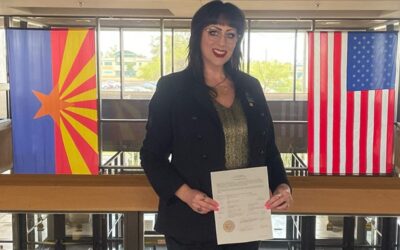By Daniel Stefanski |
Arizona law enforcement officials are warning against a federal consent decree for the City of Phoenix Police Department.
Earlier this month, the Arizona Sheriffs’ Association sent a letter to Phoenix Mayor Kate Gallego, highlighting their members’ “complete opposition to any additional federal oversight of local law enforcement in the state of Arizona.”
The letter, sent by Yavapai County Sheriff David Rhodes and Navajo County Sheriff David Clouse, wrote that “the unintended but far-reaching consequences of federal oversight in Phoenix are of great concern to all law enforcement agencies in Arizona.” They noted the exorbitant costs of such decrees – most recently in Arizona’s backyard with Maricopa County, which has shelled out “$250 million of taxpayer funds in the last 16 years including on court monitors who have a disconnect between their mandate and experience, and their investment in the community.”
Sheriffs Rhodes and Clouse pointed out “the failure of the DOJ to help Arizona secure its borders” as another strike against the federal government’s ability to effectively commandeer a local police department, let alone to maintain its constitutionally tasks. They stated, “The DOJ has the authority and powers to also initiate a civil rights investigation into the Department of Homeland Security and as of yet has not. One does not need to look far to see the extraordinary constitutional violations occurring at our southwest border at the hands of the DHS. We find this inequity hypocritical considering the serious public safety implications manifesting from this failure.”
The association promised its complete support to Phoenix “in rejecting an offer of negotiation or consent decree by the DOJ,” adding the sheriffs would “stand behind you in forcing litigation to shine the light for all your citizens onto the allegations.” They asserted that “the necessary oversight of your police force can be done internally, with confidence from your constituents and other law enforcement agencies.”
Just days after the sheriffs transmitted this letter, the City of Phoenix sent one of its own to the DOJ, requesting “that the Department of Justice commit to negotiating in good faith a technical assistance letter with the City of Phoenix and the Phoenix Police Department, with assurances sufficient to reassure the DOJ that the City and PPD will continue with the reforms they are in the process of implementing.” The City’s letter accused the DOJ of operating its investigation with “a lack of transparency,” alleging the federal team “has declined to meaningfully share its observations, impressions, concerns, or tentative conclusions with the City of Phoenix, PPD, or their counsel despite numerous requests, and has rejected a specific request for a mid-investigation briefing.”
According to the City of Phoenix, “a technical assistance letter would allow the DOJ to provide Phoenix remedial recommendations and mechanisms to ensure proper implementation without the presence of a court enforced consent decree and monitor.”
The city argued that its Interim Chief, Michael G. Sullivan, has helped to enact meaningful reforms over “virtually every aspect of the operations implicated by the DOJ investigation.” City officials made the case that Sullivan’s changes “demonstrate a powerful commitment to reform, a commitment that warrants a different approach from the DOJ than has been the case over the past dozen years.”
Late last year, Arizona State Representative David Marshall and 20 of his colleagues in the chamber sent a letter to City of Phoenix officials, asking them to “swiftly reject any consent decree proposed by the DOJ and challenge the findings in the forthcoming DOJ report.”
The request from these representatives followed other petitions from Arizona officials who oppose the imposition of a consent decree upon the city’s police department. Earlier last fall, Maricopa County Attorney Rachel Mitchell posted her displeasure with the principle of federal monitoring of law enforcement departments, writing, “Look no further than MCSO to see what ‘federal monitoring’ does to agencies. Monitors (people paid to determine whether an agency is in compliance) have ZERO incentive to find compliance. It will cost the taxpayers MILLIONS and crime will increase.”
City of Phoenix Councilmember Ann O’Brien also wrote an op-ed for the Arizona Republic, voicing her sentiments regarding any arrangement handed down from the DOJ. In her piece, O’Brien wrote, “I have no intention of signing anything given to us by the Department of Justice without getting to read their findings first. That’s the thing: the DOJ gets agencies to sign an agreement in principle before ever releasing their findings, which essentially means that agency will negotiate a consent decree in good faith. Not Phoenix.”
Per the City of Phoenix’s information, the DOJ’s Civil Pattern or Practice investigation into the Phoenix Police Department “is the 71st investigation of its kind since the Violent Crime Control and Law Enforcement Act of 1994 was signed into law by President Bill Clinton.” If DOJ finds “patterns or practices of misconduct,” then Phoenix will likely find itself with a federal monitor.
Daniel Stefanski is a reporter for AZ Free News. You can send him news tips using this link.








